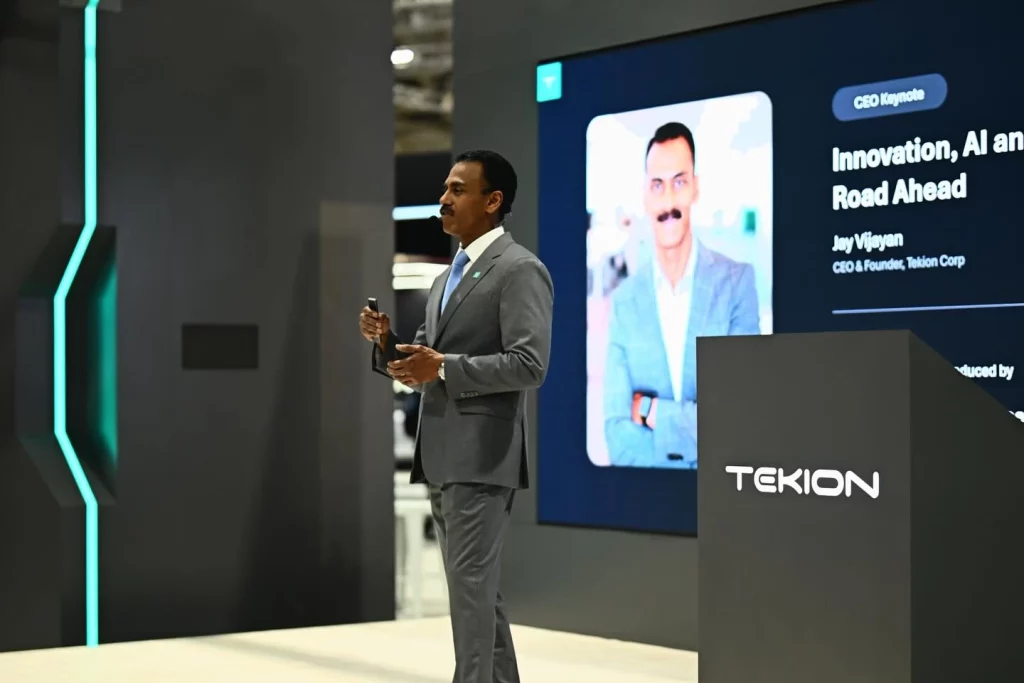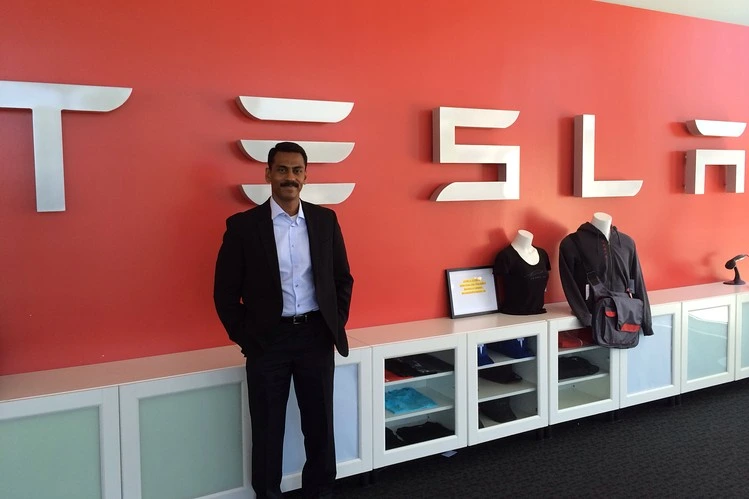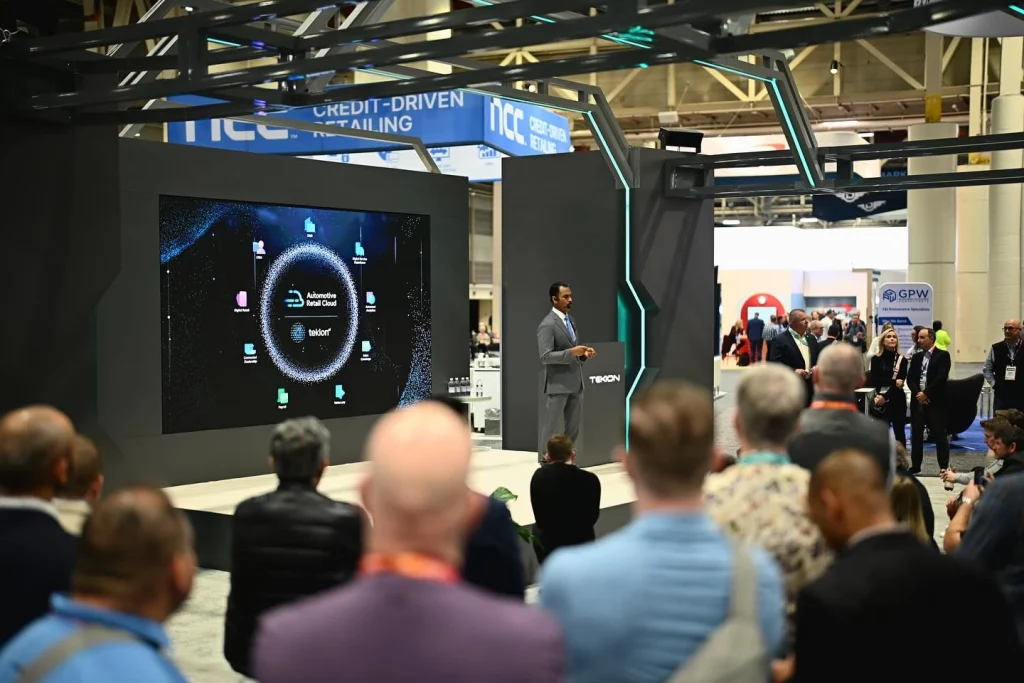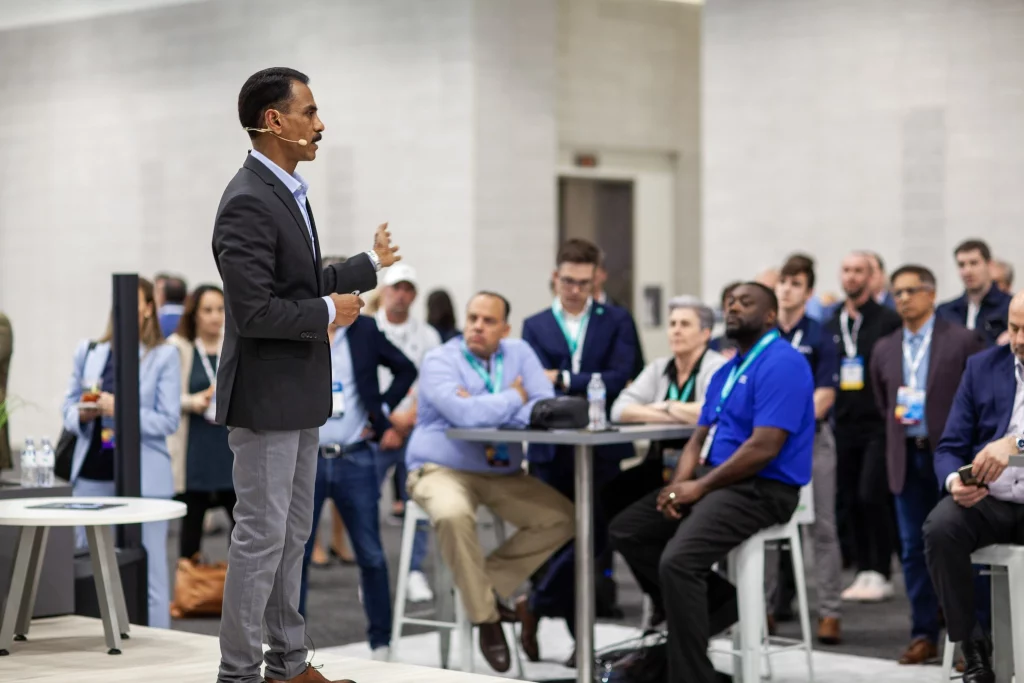(October 25, 2025) Last year when Tekion Corp announced that it had raised $200 million from Dragoneer Investment Group, boosting its valuation to over $4 billion, few were surprised. With that the company had raised more than $ 640 million from firms like BMW, General Motors, Airbus Ventures and Hyundai among others. For those who had followed its founder Jayaprakash “Jay” Vijayan’s journey from the chaos of Chennai’s small computer classrooms and struggling family business to Tesla’s sleek innovation floors, this was another calculated milestone in a career carved not by speed, but by stamina. “I believe in long-term success,” Jay Vijayan remarked in a recent podcast, offering advice to founders. “Make sure your bigger-picture plan is focused on the long term, and keep building the blocks every day toward that goal. Because if you don’t have that focus, it’s easy to get swayed.”
Former Tesla CIO Jay Vijayan is the founder and CEO of Tekion Corp, a cloud technology company headquartered in Pleasanton, California, that is transforming how cars are bought, sold, and serviced. With its Asia-Pacific headquarters in Bengaluru and a regional center in Chennai, Tekion has also expanded its footprint to the UK, Canada, Germany, and France. The company brings customers, car manufacturers, and dealers together on one connected platform, eliminating the disconnect that has long plagued the automotive retail experience.

Jay Vijayan | Photo Credit: Tekion Corp
Integral to Tekion’s innovation is its Automotive Retail Cloud, a digital platform that runs everything a car dealership needs from sales and service to customer management and accounting. Unlike traditional systems, Tekion’s software lives entirely online. It’s a Software as a Service (SaaS) model that users simply access through the internet which means no installations, no maintenance, no bulky servers. With artificial intelligence woven throughout for dealers its means no cumbersome servers or outdated systems, just a single, easy-to-use platform that connects every part of the business, and deliver the kind of transparent, frictionless experience that today’s car buyers expect.
From struggling family business to $4 billion venture
Jay Vijayan was born in Chennai. His father ran a computer science training institute. This early exposure shaped Jay’s curiosity about technology. After completing his schooling at AVM Matriculation and Avichi Higher Secondary Schools, he earned both a BSc and MSc in computer science from the University of Madras.
But his education was academic as well as entrepreneurial. In his early twenties, while still in college, Jay found himself running a struggling family software and training business that had taken a heavy bank loan. For years, he juggled studies and crisis management, sleeping in the office and fighting to turn the business around.
The venture eventually failed, but instead of walking away, Jay took the accountability of the family business. “Someone trusted us with money,” he recalled, “And I felt I had to return it. I never, even for a single moment, thought bankruptcy was an option. It was hard, but paying back that loan gave me the biggest relief of my life.” For over a decade, he slogged to pay off the debt, rupee by rupee, while building his career abroad. That experience shape the two values of integrity and ownership that defines his life.
If you don’t go through the tough times, you’ll never see the good ones. You have to put yourself under pressure to grow like a muscle.
Jay Vijayan
Learning from the giants: Oracle, VMware, and Tesla
Jay’s first professional chapter unfolded in the corridors of corporate technology. He began at Bahwan CyberTek, then worked in Singapore before moving to the U.S. in the late 1990s. In 1999, he joined Oracle, where he spent eight years as a programmer and later as a senior manager. From 2007 to 2012, he served as Senior Director of Application Development at VMware, leading teams that managed business-critical software as the company’s revenues climbed to nearly $4 billion.

Jay Vijayan at Tesla | Photo Credit: WSJ
But his defining career move came in 2012, when Elon Musk personally hired him to be Tesla’s first Chief Information Officer. The task was to build Tesla’s digital backbone from scratch. Where most companies would have licensed an ERP system from SAP or Oracle, Musk wanted Tesla’s own that could handle everything from manufacturing to sales. Jay and his team built Warp, Tesla’s homegrown enterprise resource planning platform that would help the automaker scale from a near-zero revenue startup to a $5 billion-a-year powerhouse.
“It wasn’t pretty at first,” he remarked. “It was scrappy and buggy, but we made it work.” The project taught Jay his most valuable professional lesson, and that was ‘own your core systems’. “If you don’t control what delivers value to your customers, you control nothing,” he says.
The birth of Tekion: Building the future of automotive retail
By 2016, after four transformative years at Tesla, Jay was ready to build something of his own. The question was what could he build next that was equally foundational? His answer was Tekion Corp, a company that would reinvent how people buy and service cars.
Automotive retail, Jay realized, was still running on outdated, fragmented software. Dealers, manufacturers, and consumers operated on disconnected systems. “The industry was full of cracks,” he said. “Some people got a great experience, others got a poor one. We wanted to fix that.”
Tekion set out to connect every part of the automotive ecosystem on a single cloud platform that Jay calls an “ERP++.” Its Retail Cloud powers dealerships’ day-to-day operations; the Enterprise Cloud connects manufacturers and their customer touchpoints; and the Partner Cloud links lenders, insurers, and service vendors.
For four years, Tekion operated in stealth mode. “We weren’t sitting in an office writing code,” Jay explained. “We were sitting inside real dealerships.” His team shadowed car salesmen, technicians, and service managers to understand every inefficiency.
View this post on Instagram
Taking the risk no one else would
In a move that defied all startup logic, Jay decided to buy two car dealerships. The risk was enormous. Dealerships are capital-intensive businesses where cars depreciate, bank loans pile up, and cash flow can dry overnight. Even Jay’s inner circle warned against it. But he insisted. “If we don’t live their problems, how can we solve them?” he asked.
The gamble paid off. Tekion’s engineers embedded themselves in dealership operations, observing the chaos of inventory, parts, and service workflows. “Owning those dealerships gave us unfettered access,” Jay said. “It was one of the best decisions we made.”
During the pandemic, that on-the-ground knowledge saved Tekion. When COVID-19 shuttered showrooms, the company built a remote car-selling feature within weeks, allowing dealers to sell vehicles entirely online. The feature now called Concierge became a cornerstone of Tekion’s platform.
Building what others buy
The same obsession with control drove Tekion’s boldest decision yet and that was to build its own accounting and financial systems from scratch. When advisors suggested integrating with existing small-business accounting software, Jay declined. The off-the-shelf solutions couldn’t handle the multi-store, multi-bank complexities of large dealerships. “It was nerve-wracking,” he admits. “If we failed, we could have gone out of business. But we pulled it off.”
Tekion’s homegrown accounting suite now ranks among the most sophisticated in the automotive industry, and it even has patents to prove it. “That was Tesla’s influence,” Jay said. “At Tesla, we learned that your destiny has to be in your control.”
Turning customers into investors
Tekion’s authenticity has made believers out of its biggest clients. Over the years, General Motors, BMW, Hyundai, Renault–Nissan–Mitsubishi, and Exor (the parent of Stellantis and Ferrari) have become both customers and investors. Jay insists this wasn’t luck. It was design.
If you’re solving a real industry problem, the biggest players want to be part of the solution. When they invest, it’s not just about money; it’s about validation.
Jay Vijayan

Jay Vijayan | Photo Credit: Tekion Corp
In 2020, Tekion raised $150 million in Series C funding. A year later, it secured $250 million in Series D, reaching a valuation of $3.5 billion. Then came the 2024 Dragoneer round, taking it beyond $4 billion.
What’s even more telling is how Tekion handled growth. When two corporate venture arms competed to lead an investment, Jay convinced both to join, even at a slightly lower valuation. “We don’t need a higher price,” he said at the time. “We need the right partners.”
Staying grounded amid hype
In an age of trend-chasing, Jay’s restraint is his sharpest competitive edge. When analysts predicted the death of car ownership and the rise of vehicle subscriptions, many startups pivoted. Jay didn’t. “Everyone wanted us to build subscription software,” he recalls. “But I didn’t see it as a lasting trend.” He was right. Within two years, most subscription ventures shut down. “You can’t let hype dictate your vision,” he said. “Be informed, but stay grounded.”
The same balance guides Tekion’s embrace of artificial intelligence. Jay calls AI “real but overhyped,” comparing it to the early days of the dot-com boom. His team is using AI where it truly matters, and that’s inside the dealership. Tekion’s AI agents analyze service histories, mileage data, and technician notes to create transparent conversations with car owners. “If your tyre needs replacement, our AI doesn’t just say so. It shows you the tread depth, mileage since last service, and safety data,” he explained. “It builds trust.”
He believes every role will soon have its own AI copilot. “For every persona whether it is service advisor, technician or dealer manager, there’ll be an agent helping them make better decisions.”
The grit behind the growth
Behind Tekion’s meteoric rise lies discipline. Jay is open about the sacrifices like sleeping on office floors at Tesla, spending nights in dealerships during Tekion’s early releases, and risking everything for a vision he refused to outsource. He often tells young founders that grit isn’t innate; it’s built. “Go through hard things early in your career,” he advises. “It’ll make you better.”
He also reminds his team that accountability is sacred. “Even though investors don’t lend money like a bank,” he says, “I treat it the same. They trusted me. I owe them results.” His early investors have seen returns of 400x on paper, but Jay calls the company’s journey “just the beginning.”

Jay Vijayan | Photo Credit: Tekion Corp
Choosing the long game
Tekion’s story is all about choosing ownership over outsourcing, patience over panic, and purpose over hype. Each decision Jay made like the all-nighter at Tesla, the dealership purchase, the accounting rebuild, was a bet on the long game. And every time, it paid off because it was grounded in understanding, not imitation.
Today, Tekion powers millions of vehicle sales and services each year, connects hundreds of dealerships and manufacturers, and reimagines how cars are bought, sold, and serviced. Yet its founder still sounds like the young man in Chennai who refused to file bankruptcy. “If you don’t go through the tough times, you’ll never see the good ones. You have to put yourself under pressure to grow like a muscle.”
- Follow Jay Vijayan on LinkedIn
ALSO READ: Jay Chaudhry: America’s richest Indian immigrant as India tops the U.S. billionaire immigrant list



